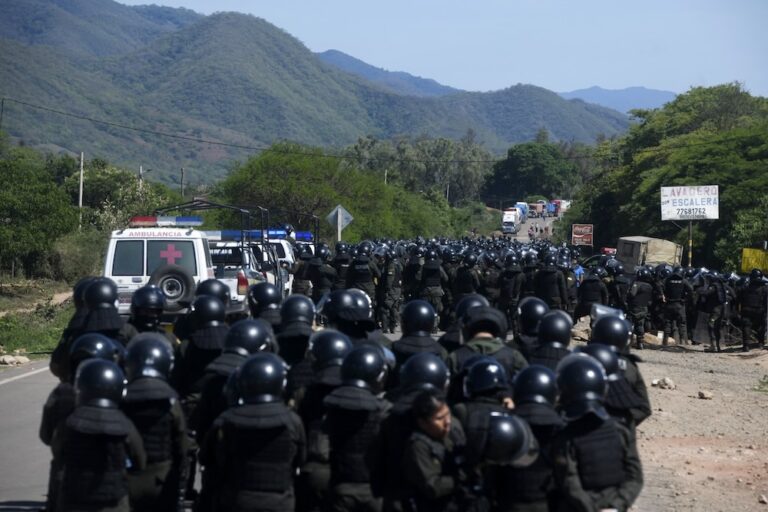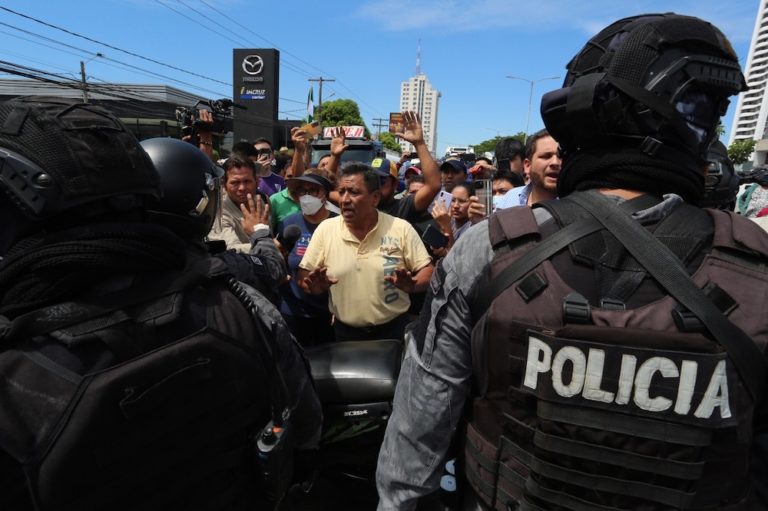Radio Vanguardia, owned by the workers at the Empresa Minera Colquiri, was the target of three explosions in one night. One of its journalists told RSF: “We were in the studio when a stick of dynamite with a lit fuse was thrown on to the roof and the rear walls of the building."
(RSF/IFEX) – 19 June 2012 – Two local radio stations in the mining town of Colquiri were attacked with explosives on the night of 14 June and forced to suspend broadcasts, although fortunately no one was injured. The whole of the mining region has been shaken by serious violence and 23 people were injured, three seriously, in clashes on the same night as the attacks on Radio Vanguardia and Radio Cumbre.
“Talks on the mining dispute resumed on 18 June under the aegis of the government,” Reporters Without Borders said. “This should serve as a reminder that freedom of information belongs to all those involved in the dispute (wage-earning workers and micro-entrepreneurs known as ‘cooperativistas’) for whom the radio stations can provide a useful forum for dialogue.
“This backs up recent moves by both the government and parliament to improve the safety of journalists,” added the press freedom organization, which also requested the prompt identification of those responsible for the attacks on the Colquiri radio stations.
Radio Vanguardia, owned by the workers at the Empresa Minera Colquiri, was the target of three explosions on the night of 14 June. One of its journalists, Rubén Quispe, told Reporters Without Borders: “We were in the studio when a stick of dynamite with a lit fuse was thrown on to the roof and the rear walls of the building.
“I and my colleagues Shirley Ramos, Silvano Cartagena and Sonia Bautista decided to stop work temporarily. The explosions could have killed us.”
Similarly at Radio Cumbre, journalists Marcelina Flores and Karen Nicolas among others decided to stop broadcasting because of safety fears. The editorial staffs at both stations are awaiting the outcome of the discussions before they resume broadcasting.
Radio Cumbre is owned by cooperativistas, who claim the rights to zinc deposits currently exploited by the company Sinchy Wayra, an affiliate of the Swiss group Glencore. Clashes broke out in Colquiri when local mine workers were angered when these two parties to the conflict signed an initial agreement on the future of the mine.
The protests were not the first to expose journalists to danger in recent times. On 16 May in La Paz, some media workers were assaulted while they were covering a demonstration by medical students and doctors in protest against a decree extending their working hours.
Carolina Ulloa, a journalist with the TV station Unitel, fainted from the effects of tear gas. Cameraman Cristian Rosendi of CNN Bolivia was injured in the face and Gastón Brito, a photographer with the agency Noticias Fides ANF, suffered a leg wound, both from missiles thrown by demonstrators.
Protective moves
Against this background, Reporters Without Borders welcomes the efforts at the highest level to improve the safety of journalists. Since 24 May, parliament has been discussing draft legislation to this effect submitted by the communications ministry and originally proposed by the La Paz Journalists’ Association. Its intention is to create an insurance scheme for journalists required to cover conflicts and social unrest, or high-risk events more generally. They would also be compensated in the case of accident or assault, in particular at night outside of working hours. It is proposed that the scheme would be financed by a 1% levy on the revenues of media companies, but this is still under discussion.
This measure is a follow-up to a government decree that requires news organizations to ensure staff are provided with night-time transport. The decree was enacted after the double murder of brother and sister Verónica and Víctor Hugo Peñasco in El Alto on 25 February. Police made several arrests in the case and a 10th suspect has now been detained.
A third journalist, Eugenio Aduviri of the newspaper La Razón was found dead on 12 May, believed to have been killed by one of the gangs known as “cogoteros” who strangle their victims, in the same outlying suburb of the capital. Four people were arrested in that investigation.


